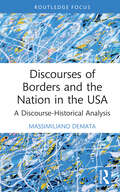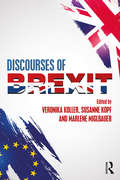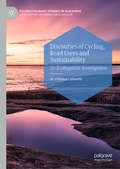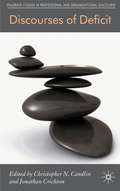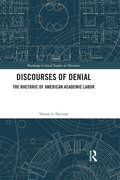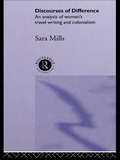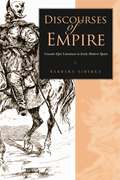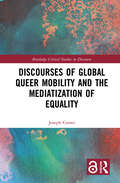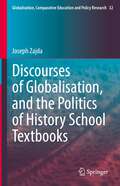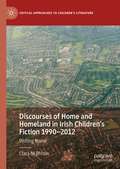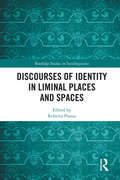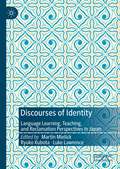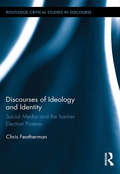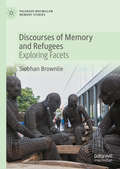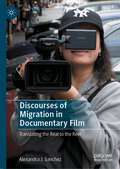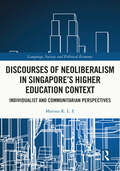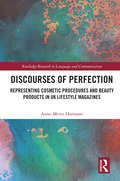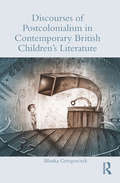- Table View
- List View
Discourse: A Concept for Information and Communication Sciences
by Jean-Paul MetzgerDiscourse is not just a means of expressing thought; it is also an autonomous body, an act through which we aim to achieve a certain effect. Modern linguistics proposes a broader definition of discourse, as a discrete and unique enunciative process, where the speaker or author makes language concrete through speech (in the Saussurian sense), and describes the various acts (oral, illocutionary, perlocutionary) that discourse performs. This book examines discourse, an object of analysis and criticism, from a wide range of perspectives. Among the concepts explored are the contributions of rhetoric in the art of discourse, the evolution of multiple approaches and the main methods of discourse analysis conducted by a variety of researchers. The book deepens our knowledge and understanding of discourse, a concept on which any research related to information and communication can be based.
Discourse: An Analysis Of Women's Travel Writing And Colonialism (The New Critical Idiom)
by Sara MillsSara Mills offers an accessible and comprehensive analysis of the term 'discourse' and explores the theoretical assumptions underlying it. This handy, easy to follow pocket guidebook for students provides:* straightforward working definitions* historical developments of the term * studied analysis of Michel Foucault* discussion of the appropriation of the term 'discourse' by feminist, colonial and post-colonial discourse theorists* examples of literary and non-literary texts to illustrate the use of 'discourse'.
Discourse: The Basics (The Basics)
by Angela Goddard Neil CareyHumans are social animals and are constantly interacting with each other through conversation, written communication, symbols and other expressions . Discourse: The Basics is an accessible and engaging introduction to the analysis of those interactions and the many forms and meanings they can take. The book draws on a range of international case studies and examples from literature, political speech, advertising and newspaper articles to address key questions such as: What is discourse? Why are there different approaches to understanding discourse? How are individual interactions connected with the larger discourses that frame our ways of thinking and behaving? How can discourse be analysed and researched? Discourse: The Basics includes subject summaries, a glossary of key terms and suggestions for further reading. It will be of particular relevance to students of language and the social sciences but also useful to all students who are interested in how meanings are made.
Discourses and Representations of Friendship in Early Modern Europe, 1500–1700
by Maritere LópezInterdisciplinary in scope, this collection examines the varied and complex ways in which early modern Europeans imagined, discussed and enacted friendship, a fundamentally elective relationship between individuals otherwise bound in prescribed familial, religious and political associations. The volume is carefully designed to reflect the complexity and multi-faceted nature of early modern friendship, and each chapter comprises a case study of specific contexts, narratives and/or lived friendships. Contributors include scholars of British, French, Italian and Spanish culture, offering literary, historical, religious, and political perspectives. Discourses and Representations of Friendship in Early Modern Europe, 1500-1700 lays the groundwork for a taxonomy of the transformations of friendship discourse in Western Europe and its overlap with emergent views of the psyche and the body, as well as of the relationship of the self to others, classes, social institutions and the state.
Discourses in Place: Language in the Material World
by Ron Scollon Suzie Wong ScollonDiscourses in Place is essential reading for anyone with an interest in language and the way we communicate. Written by leaders in the field, this text argues that we can only interpret the meaning of public texts like road signs, notices and brand logos by considering the social and physical world that surrounds them. Drawing on a wide range of real examples, from signs in the Chinese mountains, to urban centres in Austria, Italy, North America and Hong Kong, this textbook equips students with the methodology and models they need to undertake their own research in 'geosemiotics', the key interface between semiotics and the physical world.Discourses in Place is highly illustrated, containing real examples of language in the material world, including a 'how to use this book' section, group and individual activities, and a glossary of key terms.
Discourses of Ageing and Gender: The Impact of Public and Private Voices on the Identity of Ageing Women
by Clare AndersonThis book presents in-depth investigation of the language used about women and ageing in public discourse, and compares this with the language used by women to express their personal, lived experience of ageing. It takes a linguistic approach to identify how messages contained in public discourse influence how individual women evaluate their own ageing, and particularly their ageing appearance. It begins by establishing the wider cultural context that produces prevailing attitudes to women, before turning to an analysis of representations of the ageing female body in beauty and cosmetic advertising and the lifestyle media. The focus then moves to a detailed investigation of women’s own perceptions of the process of ageing and of their ageing appearance as revealed through their personal narratives. The final chapters challenge dominant attitudes to women and ageing by presenting two case studies of women who for different reasons and in different ways refuse to conform to cultural expectations. This work provides a platform for further academic research in the fields of linguistics, gerontology, gender and media studies; as well as offering meaningful applications in the wider domains of business and advertising.
Discourses of Ageing in Fiction and Feminism
by Jeannette KingThis book explores the way older women are represented in society. Through close readings of novels by major 20th century novelists, compared with the more dominant representations of female ageing to be found in popular culture it suggests that they offer a feminist understanding of the 'invisible' woman sometimes lacking in feminism itself.
Discourses of Borders and the Nation in the USA: A Discourse-Historical Analysis (Routledge Focus on Applied Linguistics)
by Massimiliano DemataThis book introduces an innovative critical analysis of borders in contemporary political discourse, using examples from the Trump presidency and early stages of the Biden presidency to explore how borders are used as mechanisms of power to invoke different notions of national identity. // The volume considers border as discursive construct, reflecting on their importance in the construction and expression of national identity across different forms of modern political discourse. Employing a framework informed by Ruth Wodak’s Discourse-Historical Approach, Demata examines how analyzing discourse from the Trump and Biden presidencies can reveal unique insights into how politicaians and other stakeholders use borders to recontextualize historical discourses of national identity and employ discursive strategies of inclusion and exclusion in promoting the idea of “the nation.” In adopting an approach which situates these discourses within their historical and socio-cultural contexts, the volume helps to further bridge the gap between different disciplines toward offering a multi-faceted understanding of notions of borders and national identity in contemporary political language. // This book will be of interest to students and scholars in discourse analysis, language and power, language and politics, political science, and border studies.
Discourses of Brexit
by Veronika Koller Susanne Kopf Marlene MiglbauerDiscourses of Brexit provides a kaleidoscope of insights into how discourse influenced the outcome of the EU referendum and what discourses have sprung up as a result of it. Working with a wide variety of data, from political speeches to Twitter, and a wide range of methods, Discourses of Brexit presents the most thorough examination of the discourses around the British EU referendum and related events. It provides a comprehensive understanding of the discursive treatment of Brexit, while also providing detailed investigations of how Brexit has been negotiated in different contexts. Discourses of Brexit is key reading for all students and researchers in language and politics, discourse analysis and related areas, as well as anyone interested in developing their understanding of the referendum.
Discourses of Cycling, Road Users and Sustainability: An Ecolinguistic Investigation (Postdisciplinary Studies in Discourse)
by M. Cristina CaimottoThis book employs a Critical Discourse Studies (CDS) framework to examine cycling mobility, marking a new turn in ecolinguistic discourse analysis. The author focuses specifically on environment-related arguments concerning the promotion of higher levels of cycling, mainly as a means of transport, and investigates the “US vs. “THEM” narratives present in many discourses about road users. Analysing newspaper articles, institutional documents and spoken interviews, the author searches for a positive new discourse that would inspire and encourage cycling as a habitual means of transport, rather than simply exposing ecologically destructive discourse. The book will be of interest to discourse and ecolingusitics scholars, as well as contributing to the lively debate about how to increase cycling in fields such as sustainability, sociology, transport planning and management.
Discourses of Deficit
by Jonathan Crichton Christopher N. CandlinKey practitioners and researchers explore how people routinely and at particular sites are discursively constructed as deficient in ways that may affect their life chances. The book offers examples of how adopting multiple perspectives on research can provide a rich explanatory analysis of the construct of 'deficit' in a range of domains.
Discourses of Denial: The Rhetoric of American Academic Labor (Routledge Critical Studies in Discourse)
by Thomas A. DiscennaDiscourses of Denial explores the myriad ways that the labor of those employed by universities is situated as somehow distinct from ordinary labor. Focusing on a variety of sites where academic labor is discursively constructed in popular consciousness including among the professoriate itself, its critics and detractors, the unionization struggles of graduate students, the invisibility of contingent academics and the resistance to the unionization of student athletes. Merging Critical Rhetoric (CR) with Critical Discourse Analysis (CDA) this study examines myth that "academic work is not the same as other labor" (Pason, 2011, p. 1786). The denial of academic labor functions to underwrite an attack on labor in all of its variations producing what Berardi (2009) calls a "new kind of worker [who] value[s] labor as the most interesting part of his or her life and therefore no longer opposes the prolongation of the working day but is actually ready to lengthen it out of personal choice and will" (p. 79). The professoriate is, therefore, not a retrograde figure of more genteel times but the emblematic figure of late capitalism’s transition to cognitive labor and with it an unceasing colonization of the human lifeworld.
Discourses of Difference: An Analysis of Women's Travel Writing and Colonialism
by Sara MillsFirst published in 1993. Routledge is an imprint of Taylor & Francis, an informa company.
Discourses of Empire: Counter-Epic Literature in Early Modern Spain (Studies in Romance Literatures)
by Barbara SimerkaThe counter-epic is a literary style that developed in reaction to imperialist epic conventions as a means of scrutinizing the consequences of foreign conquest of dominated peoples. It also functioned as a transitional literary form, a bridge between epic narratives of military heroics and novelistic narratives of commercial success. In Discourses of Empire, Barbara Simerka examines the representation of militant Christian imperialism in early modern Spanish literature by focusing on this counter-epic discourse.Simerka is drawn to literary texts that questioned or challenged the imperial project of the Hapsburg monarchy in northern Europe and the New World. She notes the variety of critical ideas across the spectrum of diplomatic, juridical, economic, theological, philosophical, and literary writings, and she argues that the presence of such competing discourses challenges the frequent assumption of a univocal, hegemonic culture in Spain during the imperial period. Simerka is especially alert to the ways in which different discourses—hegemonic, residual, emergent—coexist and compete simultaneously in the mediation of power. Discourses of Empire offers fresh insight into the political and intellectual conditions of Hapsburg imperialism, illuminating some rarely examined literary genres, such as burlesque epics, history plays, and indiano drama. Indeed, a special feature of the book is a chapter devoted specifically to indiano literature. Simerka's thorough working knowledge of contemporary literary theory and her inclusion of American, English, and French texts as points of comparison contribute much to current studies of Spanish Golden Age literature.
Discourses of Global Queer Mobility and the Mediatization of Equality (Routledge Critical Studies in Discourse)
by Joseph ComerThis book critically unpacks the why and how around everyday rhetorics and slogans promoting global LGBTQ equality. Examining the means by which particular discourses of progress and hope are circulated globally, it offers unique insights into how LGBTQ livelihoods, relationships, and social movements are legitimated and valued in contemporary society. Adopting an innovative critical discourse-ethnographic approach, Comer draws on scholarship from the sociolinguistics of global mobility, queer linguistics, and digital media studies, offering in-depth analyses of representations of LGBTQ identity across a range of domains. The volume examines semiotic linkages between: LGBTQ tourism marketing; Cape Town, South Africa, as a locus for contemporary ideologies of global mobility and equality; diversity management practices framing LGBTQ equality as a business imperative; and, humanitarian discourses within transnational LGBTQ advocacy. Autoethnographic vignettes and principles from within queer theory are incorporated by Comer’s critical discourse-ethnographic approach, giving voice to personal experience in order to sharpen scholarly understanding of the relationships between everyday ‘social voices’, globalized neoliberal political economy, and the media. Taken together, the volume expansively (if queerly) maps what Comer refers to as ‘the mediatization of equality’, and will be of interest to graduate students and scholars in critical discourse studies, sociolinguistics, and linguistic anthropology, as well as those working across such fields as media studies, queer studies, and sociology.
Discourses of Globalisation, and the Politics of History School Textbooks (Globalisation, Comparative Education and Policy Research #32)
by Joseph ZajdaThis book focuses on discourses of the politics of history education and history textbooks. It offers a new insight into understanding of the nexus between ideology, the state, and nation-building, as depicted in history education and school textbooks. It especially focuses on the interpretation of social and political change, significant events, looking for possible biases and omissions, leadership and the contribution of key individuals, and continuities. The book discusses various aspects of historical narratives, and some selected key events in defining identity and nation-building. It considers the role of historiography in dominant historical narratives. It analyses history education, in both local and global settings, and its significance in promoting values education and intercultural and global understanding. It is argued that historical narratives add pedagogies, grounded in constructivist, metacognitive and transformational paradigms, have the power to engage the learner in significant and meaningful learning experiences, informed by multiple discourses of our historical narratives and those of other nations.
Discourses of Home and Homeland in Irish Children’s Fiction 1990-2012: Writing Home (Critical Approaches to Children's Literature)
by Ciara Ní BhroinIn the context of changing constructs of home and of childhood since the mid-twentieth century, this book examines discourses of home and homeland in Irish children’s fiction from 1990 to 2012, a time of dramatic change in Ireland spanning the rise and fall of the Celtic Tiger and of unprecedented growth in Irish children’s literature. Close readings of selected texts by five award-winning authors are linked to social, intellectual and political changes in the period covered and draw on postcolonial, feminist, cultural and children’s literature theory, highlighting the political and ideological dimensions of home and the value of children’s literature as a lens through which to view culture and society as well as an imaginative space where young people can engage with complex ideas relevant to their lives and the world in which they live. Examining the works of O. R. Melling, Kate Thompson, Eoin Colfer, Siobhán Parkinson and Siobhan Dowd, Ciara Ní Bhroin argues that Irish children’s literature changed at this time from being a vehicle that largely promoted hegemonic ideologies of home in post-independence Ireland to a site of resistance to complacent notions of home in Celtic Tiger Ireland.
Discourses of Identity in Liminal Places and Spaces (Routledge Studies in Sociolinguistics)
by Roberta PiazzaThis collection highlights the interplay between language and liminal places and spaces in building distinct narratives of selfhood. The book uses an interdisciplinary approach to examine linguistic and social phenomena in places shaped by displacement and social inequality. The book also looks at chronotopes, the Bakhtinian-inspired concept of the interconnectedness of time and space in identity. The volume demonstrates how studying liminal places and spaces can offer unique insights into how people construct language and selfhood in these spaces, making this key reading for researchers in sociolinguistics, discourse analysis, geography, and linguistic anthropology.
Discourses of Identity: Language Learning, Teaching, and Reclamation Perspectives in Japan
by Ryuko Kubota Martin Mielick Luke LawrenceThis edited book draws on research on identity in language education to present a detailed and multi-faceted study of identity in language learning, teaching and revitalization settings in the context of Japan. It employs a diverse range of theoretical approaches, including poststructuralism, critical realism, cognitive behavioral theory, and complexity theory,, as well as methodologies such as linguistic ethnography, narrative enquiry, and critical multimodal discourse analysis. The authors focus on multiple dimensions of identity, illuminating linguistic, cultural and human complexity as manifested in language teaching and learning. This book will be of interest to advanced students and scholars of TESOL, applied linguistics, education, Japanese studies, East Asian studies, linguistic anthropology, indigenous languages and sociolinguistics.
Discourses of Ideology and Identity: Social Media and the Iranian Election Protests (Routledge Critical Studies in Discourse)
by Chris FeathermanIn this monograph, Chris Featherman adopts a discourse analytical approach to explore the ways in which social movement ideologies and identities are discursively constructed in new and old media. In the context of his argument, Featherman also considers current debates surrounding the role that technologies play in democracy-building and global activist networks. He engages these critical issues through a case study of the 2009 Iranian presidential election protests, looking at both US legacy media coverage of the protests as well as activists’ use of social media. Through qualitative analysis of a corpus of activists’ Twitter tweets and Flickr uploads, Featherman argues that activists’ social media discourses and protesters’ symbolic and tactical borrowing of global English contribute to micronarratives of globalization, while also calling into question master narratives about Iran commonly found in mainstream Western media accounts. This volume makes a timely contribution to discussions regarding the relationship between cyber-rhetoric and democracy, and provides new directions for researchers engaging with the influence of new media on globalized vernaculars of English.
Discourses of Memory and Refugees: Exploring Facets (Palgrave Macmillan Memory Studies)
by Siobhan BrownlieThis book explores the discourse by and about refugees and asylum seekers in relation to memory with a particular focus on the United Kingdom. A series of studies using different analytical approaches is undertaken, and together the studies shed light on this overlooked area of research. The studies or ‘facets’ presented in the monograph cover a range of contexts and discursive genres: a joint BBC/refugee-authored television documentary, refugees’ oral histories, creative life writing by asylum seekers, parliamentarians’ debates, a reworking of canonical texts and sites in a protest campaign, and non-fiction testimonies and fictional works by later generations of refugee background. The monograph introduces ‘facet methodology’ to memory studies, arguing that this approach could encourage interdisciplinary research in the field.
Discourses of Migration in Documentary Film: Translating the Real to the Reel
by Alexandra J. SanchezThis book proposes a new approach to the study of discourse in documentary film. It considers discourse as a basic factor of translation (as well as contexts, agents, and practices) and draws on the parallels between the disciplines of translating and documentary making to perform a discourse analysis of documentaries centering on migration. By relying on the concept of translation as a heuristic tool, the author highlights the discursive mechanisms of 18 documentaries on Latin American migration shown in the United States by the Public Broadcasting Service series POV between 1996 and 2018. This interdisciplinary approach facilitates a holistic analysis of documentary film discourse, while also raising awareness of positive discourses of migration. The book will be of interest to students and scholars involved in the study of discourse, translation, documentary, television, and migration.
Discourses of Neoliberalism in Singapore's Higher Education Context: Individualist and Communitarian Perspectives (Language, Society and Political Economy)
by Marissa Kwan Lin EE explores, using textual (words) and visual (image) data from the corporate newsletters of two prominent Asian universities, how particular discourses and their associated discursive representations of neoliberal logic and subjectivity occur in higher education. In particular, she looks at the expression of both institutional priorities and state imperatives that lend themselves to a complementarity built upon two contradictory perspectives: individualism and communitarianism. She argues that the ever-increasing demand for, and utility of higher education in neoliberal society means that it no longer functions merely to provide knowledge and skills, but has implications for society, the individual and the state with regard to their ways of thinking, doing and being. Contributing to a growing corpus of literature on how higher education around the world is being shaped by neoliberal policies, E’s research is based on work done in the city-state of Singapore, a less-well represented context in current literature. While both higher education institutions possess significantly different institutional identities and backgrounds, the alignment of their varied representations of neoliberal logic and subjectivity with state-sanctioned imperatives that indirectly impose demands and constraints shows how neoliberalism as ideology adapts to the socio-political, socio-cultural and socio-economic dimensions that make up the Singapore context. The discursive representations of context-dependent neoliberal logics and subjectivity are discussed in terms of their ideological implications, focusing primarily on the complementarity between seemingly contradictory ideological positions. E’s work uses an innovative framework that integrates aspects of Discourse Theory with Critical Discourse Analysis and demonstrates the use of this framework through empirical linguistic and image analysis. Appealing to academics and graduate students in linguistics, especially those with an interest in critical multimodal discourse analysis, audiences from the domains of higher education research, critical geography, sociology and political science will also find this a useful book.
Discourses of Perfection: Representing Cosmetic Procedures and Beauty Products in UK Lifestyle Magazines (Routledge Research in Language and Communication)
by Anne-Mette HermansThis book explores editorial and advertising discourses related to cosmetic procedures and beauty products and services in UK lifestyle magazines, offering a holistic perspective on the normalisation of cosmetic procedures and the societal context in which particular perceptions have flourished. The volume examines the societal climate that contributed to cultural perceptions of the body as object and project, and constructions of masculinities and femininities as context for developments in lifestyle magazines’ content on beauty and cosmetic procedures. Integrating approaches from Critical Discourse Analysis, Thematic Analysis, and Content Analysis, Hermans explores the varying ways in which cosmetic procedures and other beauty products are marketed to different audiences and examines phenomena such as the problem/solution rhetoric, and developments in beauty advertising discourse specifically targeted at men. The book also investigates the continuum view of beauty products and cosmetic procedures, and examines the implications of these blurred boundaries for the regulation of the cosmetic surgery industry. This innovative contribution to research on the representation of cosmetic procedures and beauty products in the media will be of interest to scholars researching at the intersection of language, gender, individualised body projects, and sexuality.
Discourses of Postcolonialism in Contemporary British Children's Literature (Children's Literature and Culture #100)
by Blanka GrzegorczykThis book considers how contemporary British children’s books engage with some of the major cultural debates of recent years, and how they resonate with the current preoccupations and tastes of the white mainstream British reading public. A central assumption of this volume is that Britain’s imperial past continues to play a key role in its representations of race, identity, and history. The insistent inclusion of questions relating to colonialism and power structures in recent children’s novels exposes the complexities and contradictions surrounding the fictional treatment of race relations and ethnicity. Postcolonial children’s literature in Britain has been inherently ambivalent since its cautious beginnings: it is both transgressive and authorizing, both undercutting and excluding. Grzegorczyk considers the ways in which children’s fictions have worked with and against particular ideologies of race. The texts analyzed in this collection portray ethnic minorities as complex, hybrid products of colonialism, global migrations, and the ideology of multiculturalism. By examining the ideological content of these novels, Grzegorczyk demonstrates the centrality of the colonial past to contemporary British writing for the young.







